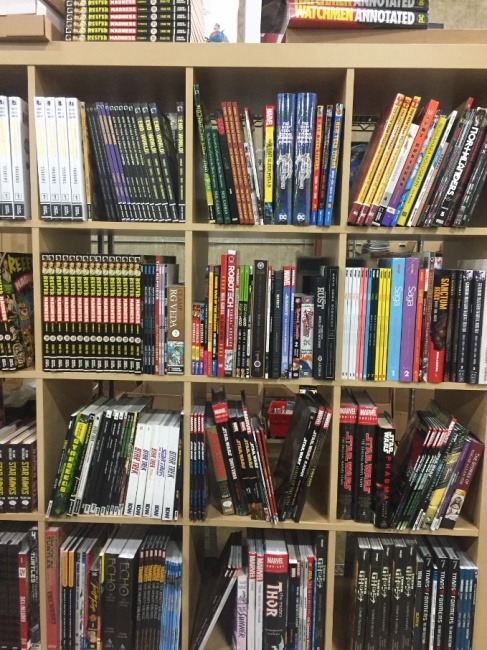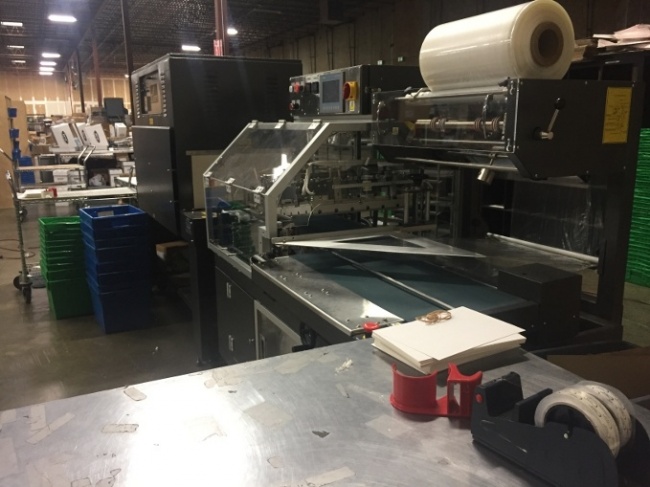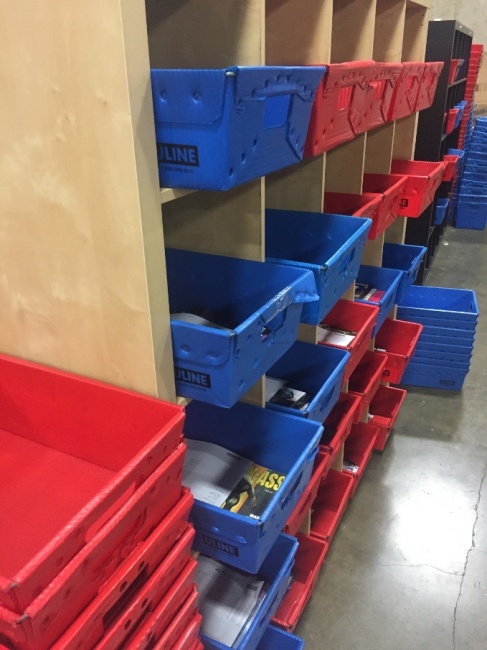In Business 3x3, a business retailer or executive will share their experience with three things they’ve done right, three things they’ve done wrong, and what else they’ve learned along the way.
So many comic retailing journeys start with a raft of longboxes in a basement, and a passion for the material. Christina Merkler’s started with intimate apparel and Estee Lauder.
Merkler (then Christina Blotkamp) was managing those departments at a Hudson’s department store in the 90s, when she met another employee, Cameron Merkler. They later married. This proved to be a significant event, of course, but working at the store was also significant.
"That’s how I first learned how to take care of customers, how to keep issues from escalating and all that,” she says today. "And retail is tough. The hours are long, you’re always working holidays and so on. That store set me up nicely for owning my own business, where we still don’t get weekends and holidays off!"
The business is DCBS, Discount Comic Book Service, a deep-discount retailer joined more recently by In Stock Trades. Cameron had the idea for DCBS in the nascent internet days, and the company launched in June, 1999.
"My husband came to me and said, ‘Hey, I think I want to start this Internet business. Don’t worry; you won’t have to do anything,’" Merkler says. "And… that was a big, giant lie! He now admits that was the thing he was most wrong about."
Regardless, DCBS and In Stock Trades have become retail juggernauts, and through the lens of online-only, Merkler has learned a lot.
THE GOOD
Bounce Ideas Off Others
Merkler likes finding an unlike mind, and taking advantage of the differences.
"Probably the smartest thing I do is constantly bounce ideas off of Cameron, and he does the same with me," she says. "The reason I think it’s smart is that he’s the exact opposite kind of personality that I am. I’m outgoing, talky, emotional. He’s the quiet, analytical introvert. I have big ideas I go to him with, and he’ll say, ‘Okay, here’s 10 reasons that’s not going to work.’"
Merkler is sure the synthesis works.
"There’s no question having him as a partner is the single biggest benefit our business has in building to success."
And her inking is that the opposite is a pitfall as well.
"Too many like-minded individuals all go in and saying, ‘Yeah, yeah! This is great! This is the way to do things!,’" she says. "But you really need someone with that opposite viewpoint to serve you well."
Stick to the Bare Minimum
It’s an Internet business, so you can afford to do some things on the cheap. But like most Internet businesses, margins are razor-thin at DCBS. Merkler thinks her thrift allowed them to get off the ground, and that lesson can be applied everywhere.
"When people open a comic shop, you usually can’t afford the best right from the beginning,” she says. "We couldn’t have been successful on these margins if we hadn’t started out in our basement, working 13-hour days for almost nothing until we were really able to pay ourselves."
Merkler admits it is tough.
"I don’t like it. It’s not too much fun," she says. "I like that new, bright, shiny thing! But it’s more important to constantly re-invest in the business."
Always Improve
A 1999 business model can’t work today. The only constant is change, and improvement.
"Whether it’s internal efficiencies, how we take care of the customer, whatever, we are constantly improving," Merkler says. "Every week, we’re constantly saying, ‘How can we do this better?’ We can only give so much of a discount. We’re at the wall on that. So how can we make the experience better for the customer, and at the same time, get more efficient so we can pay our employees more? We’re constantly trying to figure that out."
Technology has helped.
"Ten years ago, we had customer pick lists, all on paper," Merkler says. "And it got to a point where our customer list was so big, it got daunting. So Cameron said, ‘Well, how about if we scan it?’ So we bought scanners and had a programmer set up a system. Now we queue up a customer’s order on an iPad, and we know who picked the order, and how long it took them. We’ve come a long way from hand-picking off of thousands of reams of paper. So the thing that has allowed us to maintain our process and hopefully maintain our quality is constantly improving our systems."
THE BAD
Don’t Be Ruled by Emotion
Merkler admits that she can get fiery, and it’s something she’s looking to curb.
"I’m so passionate about my business that I can get emotional very easily, and I’m not as delicate with people as I should be," she laughs. "It has not served me well in previous dealings with people who are important to my business. A lot of people can get emotional, but I can definitely be abrasive at times. It’s something I’m trying to work on."
Merkler is learning not to bite the hand that feeds her. "I’ve gone up to publishers and said, ‘Hey, you really screwed me on this,’ and… I don’t do that anymore. Now before I say anything, I sit back and think about how this will affect me in the long run: Is this constructive? There are many times I’ve gone to publishers or suppliers before and was not constructive. Now I try to come to them with a possible solution, look at them as a partner."
In all Merkler thinks she’s learned this lesson in time.
"I feel I haven’t burned any bridges, but I know I have got emotional for the wrong reasons," she says. "After 19 years in business, you have to find out what works."
Don’t Be Too Optimistic
Planning for a sunny day is great. Planning for rain is probably more important.
"Sometimes you think everything is going to be fine, when you should plan for the worst," Merkler says. "I am an utter optimist, so when things don’t work out as planned, I tend to be reactive rather than proactive in a crisis. I’ve learned from my mistakes, but I feel like I’m reacting a lot."
DCBS and In Stock Trades recently consolidated their business in Memphis, which required moving the DCBS team from Indiana. There have been bumps in the road.
"The move to Memphis has been a challenge," Merkler says. "We’re people who want things to work immediately, and staffing has been an issue."
Yeah, Watch Out for Moves
DCBS got their Diamond shipments fulfilled out of Plattsburgh, NY for 18+ years before being switched to Olive Branch, MS. That precipitated a move to Memphis.
"Suddenly, the post office you’re used to dealing with is different, even the Office Depot you go to is a different place, and there are different people than you’re used to dealing with," Merkler says.
The net effect is one of upset, especially when dealing with the slower pace of life the South brings. Merkler is finally smoothing out the wrinkles.
"It’s hard for me to think of it as bad, because it has worked out," she says. "The last few months have been a vast improvement. But it has been a cultural change."
And What Else?
"Cameron did all the research on everyone else out there on the Internet at the time [1999, for the launch of DCBS] and everyone was doing complicated things, tiered discounts. He said he wanted to do something more simplistic. His thought was ‘I want people to get almost as good a discount as I get.’ And that’s how it started."
"We finished our basement, bought some bookshelves, and got a six-foot table and one computer. That was the beginning."
"We still work together every day, but he’s on the other side of the building. And that works out the best, because we are so opposite-thinking. And we run our teams differently. I pretty much run the DCBS team, and he runs the In Stock Trades team. He was in Memphis without me for three years running In Stock Trades, and we just brought DCBS down."
"The greatest thing I do is listen to my husband 90% of the time. And he listens to me 90% of the time."
"I see people getting emotional every day, certainly on social media. The strength I want to have now is to be able to look at myself and say, ‘That was shitty, I don’t want to act like that.’"
"By now, I think I’ve managed literally every personality type on the planet. And there’s a real positive in that. You learn that you have to change your perspective and how you deal with different people on your staff based on who they are. And if you don’t, well, you’ll never get anywhere with people."
"Retailers have got slightly smarter in that they’ve learned the customer is not always right. Retail has trained consumers to almost expect too much. The customer is generally right, as long as they’re a reasonable person who understands how business works. The retail landscape has changed so much with outlets competing on price in ways we’ve never seen before. Now 20 or 30 years ago when everything was full price, margins were high enough where you could deal with replacing things that maybe shouldn’t have had to been replaced and etcetera."
"We find that when other retailers won’t put up with unreasonable customers… they come to us. Now we do our best to take care of everyone. But there’s a point out there where you have to say ‘enough’s enough.’ That’s the problem. As a retailer, I reach a point where after you’ve tried to rectify a problem, been professional, been more than understanding, tried your best to fix every problem, and then they start cursing at the staff and sending vulgar emails… I’m done with you. I’m not going to put my employees through your abuse. It’s not worth their money at some point. Dealing with online customers who are not face-to-face… it’s really easy for them to say really horrible stuff."
"I’ve had customers who have been literally horrible to my email staff, and then I have to get involved. And I’m always professional, but I’ll usually say, ‘This is unacceptable behavior, and I’m not going to allow it. So I’m canceling your orders, and you’re done.’ About 75% of those people immediately reply and apologize. And that’s pleasantly surprising."
"We’re an online store. We have to figure out a way to handle those customers better, or just say, ‘You’re fired as a customer’ in the nicest way possible."
"There are people spending $20 a month with us, and they want every other item replaced. At that point, on our margins, we are losing money on that customer. So how long to you want to keep having money-losing transactions?"
"Your customer service staff is on the front lines. You have to be sure they’re being treated well."
"Amazon is perfect at saying the customer is always right, because they don’t care. They make so much money they can take a loss on certain items, and at the end of the day…they make it up on volume in the items that remain profitable for them. It’s a loss for them to have to deal with that same customer over and over again."
"Everything’s on sale all the time. In the early ’90s when I worked at Hudson’s department store, we had three sales a year, and that was it. But we had traffic all the time. Didn’t matter what day of the week, we had consumers in there paying full price for things. The average consumer just doesn’t do that anymore. The Walmarts and Targets of the world have changed the entire game. Even Kohl’s is a huge player in discounting things, and still getting name brands. Even Macy’s, sale racks everywhere. The market is so much more competitive now."
"Remember who your fixer is. I never yell at my Diamond rep. Why? They’re the ones who I need to fix things when something goes wrong. They’re not malicious. They didn’t like that your shipment got damaged either. Don’t yell at your customer service rep or that chat person online. That person had nothing to do with your problem! And now they’re the one trying to fix it!"
Click Gallery below for set of full-size pics!

'Don't Worry, You Won't Have To Do Anything.'
Posted by Jim McLauchlin on May 15, 2018 @ 4:32 pm CT
MORE COMICS
'Venom' #252 to Feature Backup Story with New Suit, Plus New Story by DeFalco and Frenz
August 4, 2025
Venom #252 will feature a backup story about Venom’s new suit as well as a backup story by Tom DeFalco and Ron Frenz, the creators of the symbiote suit.
Showbiz Round-Up
August 4, 2025
The post-SDCC showbiz news is still spicy a week after the show's conclusion. It's time for another round-up!
MORE COLUMNS
Column by Scott Thorne
August 4, 2025
This week, Scott Thorne addresses some comments on last week's column and the right price for starter products.
Column by Scott Thorne
July 28, 2025
This week, columnist Scott Thorne comments on the Edge of Eternities prerelease and on Magic: The Gathering news from the Hasbro earnings report.









 View Gallery: 5 Images
View Gallery: 5 Images 



